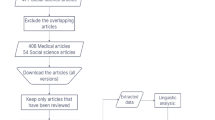Abstract
Aim
The objective of this study was to analyse a corpus of public health journal articles to identify lexical features characteristic of writing in the discipline.
Methods
A public health corpus of approximately 2 million words was compared with a reference corpus of general English in order to identify words and phrases which were relatively over-represented in the field of public health and whose meanings might not be readily accessible outside of public health. Additionally, representative samples of the public health corpus were analysed for parameters which reflect readability.
Results
It was possible to identify a distinct technical vocabulary in public health. Measures of readability indicate that articles in public health journals should be accessible to readers with a college level education.
Conclusion
This study has identified certain lexical and syntactical conventions characteristic of the public health literature. It seems not unlikely that a more widespread and explicit knowledge of the language of public health would contribute to greater communicative competence and hence more effective dispersion and implementation of health care knowledge.
Similar content being viewed by others
References
Bauer L (1993) Manual of information to accompany the Wellington Corpus of Written New Zealand English. Victoria University of Wellington, Wellington
Budgell B, Miyazaki M, O’Brien M, Perkins R, Tanaka Y (2007) Our shared biomedical language. Paper presented at International Medical Education Conference, 20–21 April 2007, Kuala Lumpur
Chung TM, Nation P (2003) Technical vocabulary in specialised texts. Read Foreign Lang 15:103–116
Chung TM, Nation P (2004) Identifying technical vocabulary. System: Intl J Educ Technol Appl Linguist 32:251–263
Cimino J, Zhu X (2006) The practical impact of ontologies on biomedical informatics. In: Haux R, Kulikowski C (eds) IMIA yearbook of medical informatics. Schattauer, Stuttgart, pp S124–S135
Cobb T, Horst M (2004) Is there room for an academic word list in French? In: Bogaards P, Laufer B (eds) Vocabulary in a second language. John Benjamins, Amsterdam, pp 15–38
Cowie AP (1998) Phraseology: theory, analysis, and applications. Oxford studies in lexicography and lexicology. Oxford University Press, Oxford, p 12
Coxhead A (2000) A new academic word list. TESOL Q 34:213–238
Coxhead A, Nation ISP (2001) The specialized vocabulary of English for academic purposes. In: Flowerdew J, Peacock M (eds) Research perspectives on English for academic purposes. Cambridge University Press, Cambridge, pp 252–267
Flesch R (1948) A new readability yardstick. J Appl Psychol 32:221–233
Francis W, Kucera H (1964) Manual of information to accompany a standard corpus of present-day edited American English, for use with digital computers. Brown University, Providence
Hyland K (2001) Humble servants of the discipline? Self-mention in research articles. Engl Specif Purp 20:207–226
Hyland K, Tse P (2007) Is there an “academic vocabulary”? TESOL Q 41:235–253
Johnanson S (1978) Manual of information to accompany the Lancaster-Oslo/Bergen Corpus of British English, for use with digital computers. University of Oslo, Oslo
Martinez I (2001) Impersonality in the research article as revealed by analysis of the transitivity structure. Engl Specif Purp 20:227–247
Martinez I (2003) Aspects of theme in the method and discussion sections of biology journal articles in English. J Engl Acad Purp 2:103–123
McEnery T, Tono Y, Xiao Z (2006) Corpus-based language studies: an advanced resource book. Routledge, London, p 347
Nation ISP (2001) Learning vocabulary in another language. Cambridge University Press, Cambridge
Nwogu K (1997) The medical research paper: structure and functions. Engl Specif Purp 16:119–138
Rayson P, Berridge D, Francis B (2004) Extending the Cochran rule for the comparison of word frequencies between corpora. Paper presented at the 7th International Conference on Statistical Analysis of Textual Data, 10–12 March 2004, Louvain-la-Neuve
Salager-Meyer F (1992) A text-type and move analysis study of verb tense and modality distribution in medical English abstracts. Engl Specif Purp 11:93–113
Seuren PAM (1998) Western linguistics. An historical introduction. Blackwell, Malden, pp 260–262
Sinclair JM (1991) Corpus, concordance, collocation. Describing English language. Oxford University Press, Oxford
Stubbs M (2005) The most natural thing in the world: quantitative data analysis on multi-word sequences in English. Paper presented at Phraseology 2005, 13–15 October 2005, Louvain-la-Neuve
Van Rijsbergen C (1979) Information retrieval. Butterworth-Heinemann, Newton
West MP (1953) A general service list of English words: with semantic frequencies and a supplementary word-list for the writing of popular science and technology. Longmans Green, London
Conflict of interest statement
The authors confirm that there are no relevant associations that might pose a conflict of interest.
Author information
Authors and Affiliations
Corresponding author
Rights and permissions
About this article
Cite this article
Millar, N., Budgell, B.S. The language of public health—a corpus-based analysis. J Public Health 16, 369–374 (2008). https://doi.org/10.1007/s10389-008-0178-9
Received:
Accepted:
Published:
Issue Date:
DOI: https://doi.org/10.1007/s10389-008-0178-9




